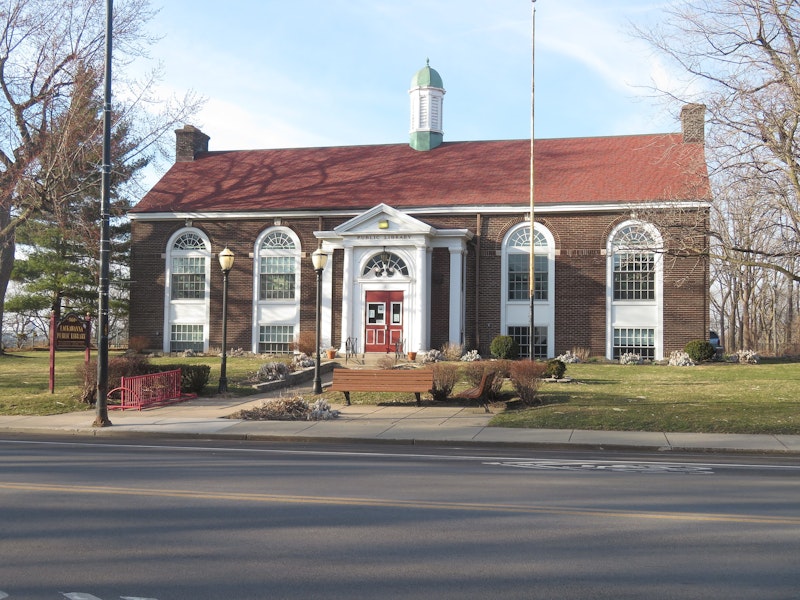I associate summers with libraries. When I came to America, it was mid-May and the summer was slowly arriving, which would turn out to be some of the most difficult times at that point in my life. The alienation was visceral. I was lost in America, despite my initial love of it, and my knowledge of the English language.
We settled in a city called Lackawanna, just outside of Buffalo, NY. It had a tradition of being a steel city (Bethlehem Steel was one of the main factories in the area) with a wide variety of immigrants, mostly Irish, German, Polish, and Italian, and some Croatian and Serbian. All the Bosnians coming in the mid-1990s added to the cultural flavor of the city.
You couldn’t go anywhere without the car, or at least, not very far. We didn’t have one so I figured out the best routes for walking. Where was I to go? Fairly soon, I found out that Lackawanna public library wasn’t too far from our apartment. I didn’t have money to buy books and the library provided a wide variety of subjects. I’d meander through the streets of Lackawanna, passing a diner on the corner of Ridge Road and South Park. I always wanted to go there but never got around to it. I was puzzled that the sign said “diner” and not “dinner,” not knowing that there was a difference between the two words. A song would pop into my head—Suzanne Vega’s 1987 “Tom’s Diner,” which quickly took me to my pre-war days, spending an inordinately long time watching MTV.
I’d pass Our Lady of Victory Basilica, a church I frequently went into, seeking refuge when I couldn’t bear the pain of being lost in America. I’d go when it was empty because I didn’t want to be an outsider during the Mass. I’d sit in silence, feeling slightly uneasy (“Can I do this? Is this allowed, a non-Catholic, alone in the church, sitting quietly?”) but I was able to breathe. An occasional person would find their way in, lighting a candle, quietly praying, holding the rosary.
I’d pass the Social Services office too, the dreaded place, which had your pick of sadistic bureaucrats. For whatever reason, they’re always women, and I believe they’re their own special metaphysical species (in Bosnia, a woman like that is known as šalteruša, which denotes a woman who works at a services office behind the counter, and most importantly, a woman without a soul).
There was such a woman—let’s call her Mrs. Cooper—who took pleasure in allotting welfare benefits, and she made no qualms to tell you that you don’t really deserve it. In addition, she was of the mindset that immigrants don’t deserve to come to America in the first place. I suppose I should’ve stayed in a refugee camp. Once, I made a point of telling her directly that she wasn’t a good person. She was taken aback, and stared at me for a few seconds. I’d love to tell you that there was this amazing existential breakthrough for our Mrs. Cooper, and that she saw the light But she just mumbled a few formulaic words and went back to her bureaucratic torpor.
My walk to the library felt like a pilgrimage, which I did almost every day. Built in 1922, the library was part of Andrew Carnegie’s donations and initiatives to build libraries in America. Designed in a colonial style, it wasn’t soulless like those modernist monstrosities, whose only implied message is “communism is good!”
The interior was always welcoming and warm for me. Beautiful, dark-stained oak shelves, hardwood floors, and details on the doors made me feel like a whole person. This juxtaposition between usual difficulties in being an immigrant and small glimpses of beauty was something that was a constant pattern in my life. The library provided an oasis, and it wasn’t a mirage in the middle of a desert but a complete reality.
I loved the literature section, especially if the books were old editions. Sometimes, it didn’t even matter what specific books I chose. I did and do judge a book by its cover and the paper texture and the font size. I have a connection to the book as an object, and I require that many of my senses are engaged in an act of reading.
This would also mark the starting point for me in which my mind would take precedence over the matters of the heart and emotion. I found a safe sphere in the books (later, this would include philosophy and theology), in which I could work out cultural and philosophical problems, but the more I delved into the mind, the further I went away from the heart of my own experience. My own questions and answers to suffering and beauty are often found in pure contemplation that often eludes the words themselves. It’s pleasant to get lost in the library labyrinth, as long as you know your way out. I’ve seen a few glimpses of exits but I haven’t found a true opening yet. I’m still in the labyrinth.

